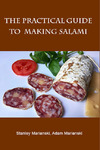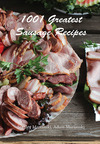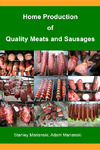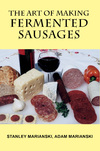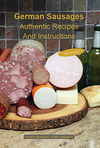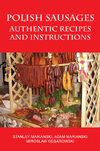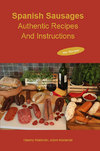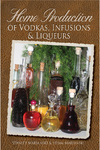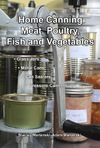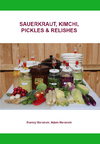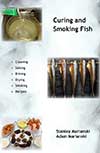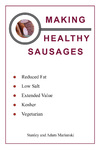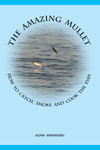Meats and Sausages
Diluting Alcohol
Alcohol is lighter than water (1 liter of alcohol weighs 790 g, 1 liter of water weighs 1000 g) but it dissolves in water easily. It is an extremely flammable liquid so exercise caution. Stay away from flames and heat sources. It does not matter whether water is poured into alcohol or vice verse. After the solution has been made, check the strength with an alcohol tester, if you have one.
Example AYou have 1 liter of 95% alcohol and you need 70% alcohol for infusion. How much water is needed? Locate the 70% column and the cell under says that 391 milliliters of water are needed. If you add 391 ml of water, you will obtain 1.391 liter of 70% alcohol.
Example BYou have 1 liter of 75% alcohol and you need 45% alcohol. How much water is needed? Locate the 45% column and the cell under says that 690 milliliters of water are needed. If you add 690 ml of water, you will obtain 1.690 liter of 70% alcohol. Of course if you halve the amounts, e.g. 0.5 liter 75% alcohol and 345 ml of water, you will also obtain 45% alcohol solution.
Table 1.1
To make 1 liter of desired alcohol Mix: 75% Alcohol Water
| 40% | 533 ml | 467 ml |
| 50% | 667 ml | 333 ml |
| 60% | 800 ml | 200 ml |
| 70% | 933 ml | 67 ml |
Often, the recipe will call for smaller volumes, for example 200 ml, 300 ml or 450 ml. The data can be easily calculated from the above table but we make it even simpler by creating table 1.4.
Table 1.2
The following table states how much water must be added to 1 liter of 95% alcohol in order to obtain alcohol of the desired strength (at 20° C, 68° F).
| 20% | 25% | 30% | 35% | 40% | 45% | 50% | 55% | 60% | 65% | 70% | 75% | 80% | 85% |
| 3.81 L | 2.87 L | 2.23 L | 1.78 L | 1.44 L | 1.17 L | 957 ml | 779 ml | 629 ml | 501 ml | 391 ml | 294 ml | 209 ml | 130 ml |
table 1.3
The following table states how much water must be added to 1 liter of 75% alcohol in order to obtain alcohol of the desired strength (at 20° C, 68° F).
The amount of water that must be added to 1 liter of 75% alcohol in orer to obtain new strength (at 20° C, 68° F).
| 20% | 25% | 30% | 35% | 40% | 45% | 50% | 55% | 60% | 65% | 70% |
| 2.78 L | 2.03 L | 1.53 L | 1.17 L | 900 ml | 690 ml | 520 ml | 360 ml | 250 ml | 150 ml | 70 ml |
Table 1.4
To make 100 ml of desired alcohol Mix: 75% Alcohol Water
| 40% | 53.3 ml | 46.7 ml |
| 50% | 66.7 ml | 33.3 ml |
| 60% | 80 ml | 20 ml |
| 70% | 93.3 ml | 6.7 ml |
Let's assume you need 300 ml of 50% alcohol. Well, take the volume that is needed for 100 ml and multiply by a 3. In this case we need 3 x 66.7 ml of 75% alcohol and 3 x 33.3 ml of water. 200.1 + 99.9 = 300 ml of 50% alcohol. We can calculate any amount by multiplying the 100 ml of desired alcohol by a corresponding factor. For example we need 750 ml of 60% alcohol. Our factor is 7.5 as 7.5 x 100 ml comes to 750 ml. 7.5 x 80 + 7.5 x 20 = 600 + 150 = 750 ml of 60% alcohol.
The Magic Equation
Often an old recipe calls for 95% alcohol, but we only have 75% alcohol or 40% vodka. We know that we would need more of a weaker alcohol, but by how much? The magic equation comes to the rescue:
- C1 x V1 = C2 x V2
- C1 = the strength of the alcohol that we should have
- V1 = the volume of the alcohol that we should have
- C2 = the strength of the alcohol that we will use instead
- V2 = the volume of the alcohol that we will use instead
The recipe calls for 1 liter of 95% alcohol, but we have only 75% alcohol at hand. How much 75% alcohol do we need?
- C1 = 95, V1 = 1 liter, C2 = 75, V2 = ?
- C1 x V1 = C2 x V2
- V2 = C1 x V1/C2
- V2 = 95 x 1/75
- V2 = 95 x 0.013
- V2 = 1.26 liter
To replace 1 liter of 95% alcohol we have to use 1.26 liters of 75% alcohol. We need more 75% alcohol because water was added to 95% alcohol to bring it down to make the 75% version. And how much water? All we have to do is to subtract the volume of 95% alcohol from the volume of 75% alcohol, in this case: 1.26 x 1.00 = 0.26 l = 260 ml. Table 1.2 asks for 294 ml which is 26 ml more than our calculation, but our result is sufficient for home production. Keep in mind that the alcohol tables are very accurate and they include corrections for alcohol contraction and temperature. It does not matter whether we use liters, milliliters, 95% or 0.95 as long as we use the same criteria for both sides of the equation. This is a very simple equation to solve that most people should be familiar with.
Example BThe recipe calls for 500 ml of 40% alcohol (vodka strength), but we have only 75% alcohol. How much 75% alcohol do we need?
- C1 = 75, V1 = ?, C2 = 40, V2 = 500 ml
- C1 x V1 = C2 x V2
- V1 = C2 x V2/C1
- V1 = 0.40 x 500/0.75
- V1 = 200/0.75
- V1 = 266 ml
We can replace 500 ml of 40% alcohol with 266 ml of 75% alcohol. This is a wonderful equation that allows us to switch over between different alcohol strengths.
Example CYou have 1 liter of 75% alcohol and you need 60% alcohol for a fruit infusion. You know that if you start adding water to 75% alcohol you will reach a point when 60% alcohol will be obtained. That could be done by using an alcohol tester. However, it would be nice to know beforehand how much water is needed. Let's start with the equation:
- C1 = 0.75, V1 = 1 liter, C2 = 0.60, V2 = ?
- C1 x V1 = C2 x V2
- V2 = C1 x V1/C2
- V2 = 0.75 x 1/0.60
- V2 = 0.75/0.60
- V2 = 1.25 liter
The answer says that you can replace 1 liter of 75% alcohol with 1.25 liter of 60% alcohol. However, you want to know how much water should be added to 75% alcohol. The amount of alcohol has not changed. You have 1000 ml (1 liter) of 75% alcohol which is a mixture of pure alcohol with water. This means that you have 75% of pure alcohol and 25% of water:
- 0.75 x 1000 = 750 ml
- This is the amount of pure alcohol.
- 0.25 x 1000 = 250 ml
- This is the amount of water.
If you add water to this solution, the volume of the solution will increase, but the volume of alcohol remains the same, as alcohol did not go anywhere. The difference is the extra amount of added water. Because the equation says that you need 1.25 liter of 60% alcohol and the original amount of 75% alcohol was 1 liter, the difference is the added water: 1.25 x 1.00 = 0.25 liter (250 ml). The conclusion is that if you add 250 ml of water to 1 liter 75% alcohol you will obtain 1.25 liter of 60% alcohol. If you look at Table 1.3 you will see that it agrees with the data.
Let's modify the equation so we can calculate water directly from the equation:
Let x = amount of water to be added, and let's calculate the amount of alcohol in the mixture before and after the water is added. Since you are only adding water, the amount of alcohol before equals the amount of alcohol after, and this is basis for the equation. Amount of alcohol before = 0.75 x 1 liter Adding x liters of water (no alcohol) Amount of alcohol after = 0.60 x (1 liter + x)
Equation:
- C1 x V1 = C2 x (C1 + x)
- C1 x V1/C2 = C1 + x
- C1 x V1/C2 - C1= x
- 0.75 x 1/0.60 - 1 = x
- 0.75/0.60 - 1 = x
- 1.25 - 1 = 0.25
- x = 0.25 liter (250 ml) of water.
Check: Beginning alcohol = 0.75 (1 liter) = 0.75 liter After water added, alcohol = 0.60 (1 + 0.25) = 0.60 x 1.25 = 0.75 liter The amount of alcohol before equals the amount of alcohol after. What has changed is the amount of water.

